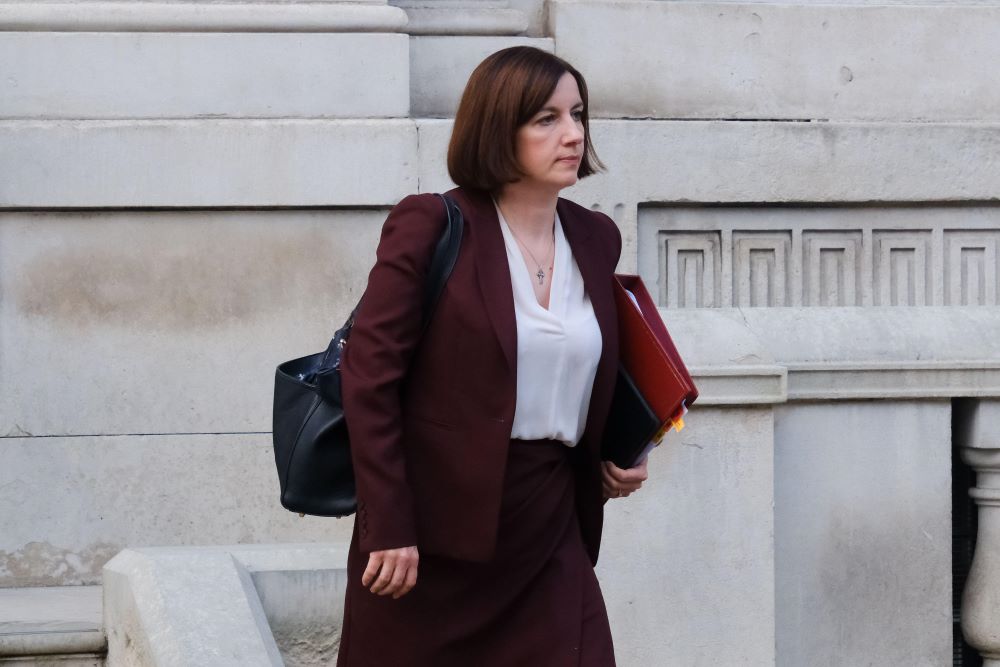Give Schools Funding Boost By Locking In Money For Disadvantaged Pupils, Says Charity
Children play hopscotch in a school playground
4 min read
The Government should guarantee an annual rise in the money given to schools to help disadvantaged pupils, a children’s charity has said ahead of the Budget.
In a report shared with PoliticsHome, charity Save the Children calls for the pupil premium funding — which was introduced under the coalition government in 2011 — to rise in line inflation or earnings, whichever is higher.
Schools get extra money to help disadvantaged pupils through the pupil premium.
However, Save the Children has called for the new Labour Government to lock in this financial support at a fixed level, warning that falling pupil numbers shouldn't be used by the Department for Education as an opportunity to reduce funding for schools.
The report says there are now so many children growing up in poverty that their numbers would be enough to fill the House of Commons almost 7,000 times.
It warns that while the welfare state was designed to support families “from the cradle to the grave”, the focus has now “moved away from the cradle”, with children living in poverty disproportionately impacted.
Meghan Meek O’Connor, policy lead at Save the Children UK, told PoliticsHome the DfE had a "golden opportunity" to rethink for the better how schools are funded.
“There is a golden opportunity for the Department for Education to protect spending on schools. Falling pupil numbers shouldn’t mean a drop off in funding, but instead serve as the ideal moment to reinvest," she said.
The charity has also called for the Government to “lock in school funding” at current levels for the next five years despite a decrease in pupil numbers. This would increase the share of funding received by pupils from deprived backgrounds by £1bn by 2030, according to modeling completed by consultancy Public First for the report.
Further modelling by Public First suggests that by increasing the Early Years Pupil Premium (EYPP) rate to the primary school rate, at an additional cost of £128m, the Government could begin to reduce the pre-school attainment gap ensuring fewer children are behind when they start school.
Meek-O'Connor said this change "could be transformative, and help to reduce the large attainment gap between disadvantaged children and their peers".
The charity has already called for a “child lock” to protect spending on child-related benefits in Wednesday's Budget, The Guardian reported.
 Education Secretary Bridget Phillipson (Alamy)
Education Secretary Bridget Phillipson (Alamy)
Save the Children says that rising poverty is “just one aspect that is impacting children’s education”, pointing to poor funding, a crisis in the special educational needs system, and the cost of the school day.
The report adds that children “need a social security system that protects them, and an education sector that is fully-funded, and allows them to thrive”.
The Liberal Democrats' education, children and families spokesperson Munira Wilson MP told PoliticsHome she was "deeply concerned" by the findings of the report.
She said that despite living in the 21st century, "the growing levels of deprivation among our young people are Dickensian".
“I’m proud that the Liberal Democrats introduced the pupil premium, helping to narrow the disadvantage gap, but the Government cannot let it continue to be worn away by inflation."
Pepe Di’Iasio, General Secretary of the Association of School and College Leaders, told PoliticsHome it was vital that school funding is maintained as pupil numbers fall in order to begin to address “the financial pressures caused by years of underinvestment”.
He said that the persisting attainment gap “shows not enough attention has been given to the needs of children growing up in poverty”.
“The Government’s commitment to bringing about an enduring reduction in child poverty in this parliament, through its Child Poverty Strategy, is a welcome step towards changing this and we now need to see tangible action," he said.
Anne Longfield, executive chair of the Centre for Young Lives, said it is important that funding for the most disadvantaged children “is never eaten away by inflation”.
“There is evidence suggesting that the funding formula for schools has disproportionately disadvantaged schools in deprived areas. The Treasury should look again at the distribution formula to ensure that it is properly aligned with the Government's Opportunity mission.”
Paul Whiteman, general secretary at school leaders’ union NAHT, said: “Child poverty harms so many aspects of children’s lives, including their ability to focus and thrive at school, and teachers do their best to help children in these circumstances.”
However, Whiteman added, schools are “constrained by shortages of funding”.
PoliticsHome has contacted The Department for Education for comment.
